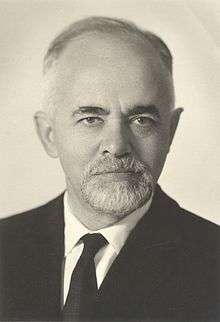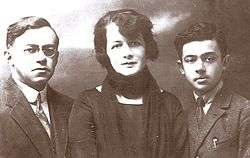Eri Jabotinsky
Eri Jabotinsky (Hebrew: עֵרִי זַ׳בּוֹטִינְסְקִי, also transliterated Ari, December 26, 1910 – June 6, 1969) was a Revisionist Zionist activist, Israeli politician and academic mathematician. He was the son of Ze'ev Jabotinsky, the founder of the opposition movement within Zionism at the time, and later served in the Knesset between 1949 and 1951, as a member of the opposition Herut party of Menachem Begin. Following his break with the party, he pursued his academic career.
| Eri Jabotinsky | |
|---|---|
 | |
| Date of birth | 26 December 1910 |
| Place of birth | Odessa, Russian Empire |
| Year of aliyah | 1919 |
| Date of death | 6 June 1969 (aged 58) |
| Place of death | Haifa, Israel |
| Knessets | 1 |
| Faction represented in Knesset | |
| 1949–1951 | Herut |
| 1951 | Independent |
Biography
Eri Jabotinsky was born in Odessa. In 1919, the family made aliyah to Mandatory Palestine. Following the arrest of his father the following year, he moved to France, attending high school in Paris and later earning a degree in electrical engineering. Between 1933 and 1935 he worked as an engineer in an aircraft factory. In 1935 he returned to Palestine, and worked as an engineer at the Naharayim power station in the Jordan Valley.

A long-term member of Revisionism's Betar youth movement, he became one of its representative leaders in 1936, and joined its worldwide board two years later. With Betar and the party's military wing, Irgun, he helped coordinate illegal Jewish immigration into Palestine; he was arrested by the British authorities in 1940. Upon his release he moved to the United States, where his father died suddenly about the same time. There, together with Hillel Kook's 'Bergson Boys', Aryeh Ben-Eliezer, Shmuel Merlin and Yitzhak Ben-Ami, they founded the Emergency Committee to Save European Jewry,[1] among others. He briefly returned to Palestine, but was again arrested by the British and expelled for illegal activities in 1944.
Following Israel's independence, he returned in 1948, and was elected to the first Knesset the following year, as a member of the Herut party's list of candidates. On 20 February 1951 however, Jabotinsky and Hillel Kook left Herut, and sat as independents for the rest of the term, although the move was not recognised by the house committee;[2] this followed on-going disagreements over the party’s direction and its new leadership by Menachem Begin.
After leaving the Knesset, he was awarded a PhD in mathematics in 1957 from the Hebrew University of Jerusalem. He also lectured on electricity theory at the Technion between 1955 and his death in 1969.
He was the father-in-law of Anatoly Rubin.
Academic publications
- Eri Jabotinsky (1971). "On the use of spherical means in hydrodynamics. Application to the study of the inception of turbulence". Israel Journal of Mathematics. 9 (1): 3–19. doi:10.1007/BF02771614.
- E. Jabotinsky (1966). "Universal relations between the elements of Grunsky's matrix". Journal d'Analyse Mathématique. 17 (1): 411–417. doi:10.1007/BF02788667.
- E. Jabotinsky (1966). "-sequences for nonembeddable functions" (PDF). Proceedings of the American Mathematical Society. 17 (3): 738–738. doi:10.1090/S0002-9939-1966-0192034-X.
- Eri Jabotinsky (1963). "Analytic Iteration" (PDF). Transactions of the American Mathematical Society. 108 (3). doi:10.2307/1993593.
- Eri Jabotinsky (1963). "Analytic iteration". Transactions of the American Mathematical Society. 108 (3): 457–457. doi:10.1090/S0002-9947-1963-0155971-X.
- Paul Erdös; Eri Jabotinsky (1960). "On analytic iteration". Journal d'Analyse Mathématique. 8 (1): 361–376. doi:10.1007/BF02786856.
- Eri Jabotinsky (1953). "Representation of Functions by Matrices. Application to Faber Polynomials". Proceedings of the American Mathematical Society. 4 (4). doi:10.2307/2032522.
- Eri Jabotinsky (1953). "Representation of functions by matrices. Application to Faber polynomials". Proceedings of the American Mathematical Society. 4 (4): 546–546. doi:10.1090/S0002-9939-1953-0059359-0.
References
- Aryeh Ben-Eliezer Jewish Virtual Library
- Mergers and Splits Among Parliamentary Groups Knesset website
External links
- Eri Jabotinsky on the Knesset website